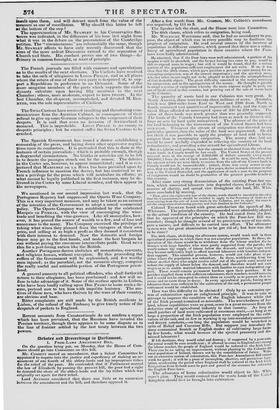We mentioned in our second impression last week, that. the
Portuguese Regency had suppressed the Oporto Wine Company. This is a very important measure, and may be taken as an earnest of the intention of the Government to adopt a sound commercial policy. The Oporto Company was established by the celebrated Marquis DE POMBAL, with the view of encouraging the wine- trade and benefiting the vine-growers. Like all monopolies, how- ever, it has proved the source of wealth to a few, and of loss and annoyance to the many. The Company exercised the privilege of taking what wines they pleased from the vintagers at their own price, and selling at as high a profit as they deemed it consistent with their interest to demand. Now the domestic and foreign buyer may go to the first hands, and make the best bargain he can without paying the enormous intermediate profit. Good news this for a port-loving nation like the British. Another Portuguese decree abolishes all monasteries, convents, and religious houses, without exception. By this proceeding the coffers of the Government will be replenished, and few worthy Men injured; as the parochial, not the monastic clergy, comprise the really useful and estimable portion of the Portuguese priest- hood.
A general amnesty to all political offenders, who shall forthwith return to their allegiance, has been proclaimed: and few will re- fuse to take advantage of it. Some of the restless spirits in Lisbon, who have been loudly calling upon Doll PEDRO to issue such a de- cree, pretend now to tax him with impolitic leniency. The mo- tives of these men, who have thriven by the woes of their country, are obvious and base.
Bitter complaints are still made by the British residents in Lisbon, of the refusal of the Embassy to give timely notice of the despatch of packets to England.






















 Previous page
Previous page